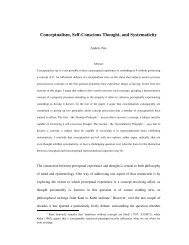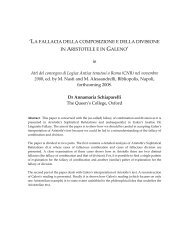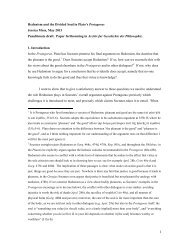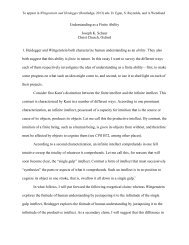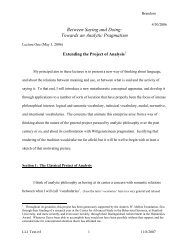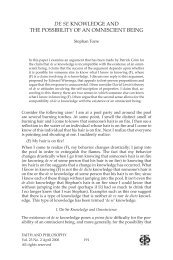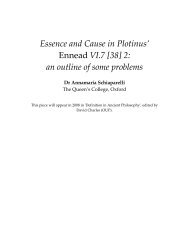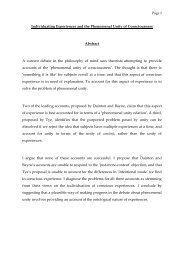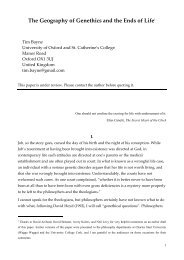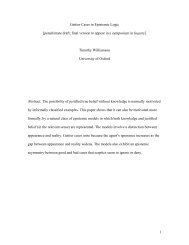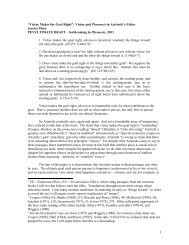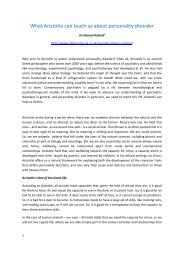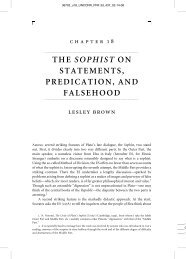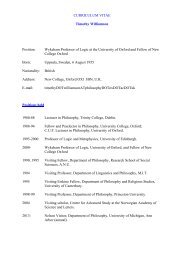Say who everyone is as you go along - Faculty of Philosophy ...
Say who everyone is as you go along - Faculty of Philosophy ...
Say who everyone is as you go along - Faculty of Philosophy ...
You also want an ePaper? Increase the reach of your titles
YUMPU automatically turns print PDFs into web optimized ePapers that Google loves.
12<br />
ends but I continue, or resume, <strong>as</strong> another such process. So when Roshi Hakun<br />
Y<strong>as</strong>utani (b. 1885), the M<strong>as</strong>ter <strong>who</strong> attempted a synthes<strong>is</strong> <strong>of</strong> Rinzai and Soto in<br />
Sanbo Kyodan (Fellowship <strong>of</strong> Three Tre<strong>as</strong>ures), says:<br />
'Having once perceived the world <strong>of</strong> Buddha-nature, we are indifferent to death' (WD<br />
8)<br />
th<strong>is</strong> cannot be fully understood in terms <strong>of</strong> changes in belief. It <strong>is</strong> not <strong>as</strong> though the<br />
Zen doctrines <strong>of</strong> no-mind and rebirth are consolations for something that remains<br />
fearful. The Buddha-nature <strong>is</strong> more fundamental than death. The cycle <strong>of</strong> birth and<br />
death depends upon the Buddha-nature but the Buddha-nature does not depend upon<br />
the cycle <strong>of</strong> birth and death. Y<strong>as</strong>utani’s 'perceived' does not mean 'perceived' in any<br />
straightforward empirical sense. Y<strong>as</strong>utani <strong>is</strong> referring to the transformation in being<br />
brought about by za-zen and other Zen techniques for awakening. The world <strong>is</strong><br />
ordinarily 'perceived' through thought and the five senses. (The mind <strong>is</strong> a sense in<br />
Buddh<strong>is</strong>m.) But the sensation <strong>of</strong> oneself <strong>as</strong> one being amongst others in that world <strong>is</strong><br />
no longer adhered to. Rather, that sensation <strong>is</strong> itself just one sensation amongst<br />
others, one more recurrent ep<strong>is</strong>ode in th<strong>is</strong> life process. The sensation <strong>of</strong> self<br />
repeatedly dies and <strong>is</strong> reborn. Once th<strong>is</strong> <strong>is</strong> gr<strong>as</strong>ped, the cessation <strong>of</strong> th<strong>is</strong> sensation <strong>is</strong><br />
not feared. After all, there are many moments without such a sensation. Th<strong>is</strong> <strong>is</strong> why<br />
there w<strong>as</strong>, all <strong>along</strong>, in a sense, no-one to die. The 'indifference' to death that<br />
Y<strong>as</strong>utani speaks <strong>of</strong> <strong>is</strong> the absence <strong>of</strong> fear <strong>of</strong> death. It <strong>is</strong> not the presence <strong>of</strong> an<br />
intellectual attitude but the absence <strong>of</strong> an emotion. Or, if the emotion ar<strong>is</strong>es, that too<br />
<strong>is</strong> p<strong>as</strong>sively acknowledged <strong>as</strong> only another transient event. It <strong>is</strong> not felt. Or, if it <strong>is</strong> felt<br />
(because it <strong>is</strong> essentially a feeling) there <strong>is</strong> no feeling <strong>of</strong> it over and above its being a<br />
feeling and certainly no feeler <strong>of</strong> the feeling. Like other emotions, it ar<strong>is</strong>es and<br />
subsides, <strong>is</strong> born and dies. It <strong>is</strong> not to be taken seriously.<br />
Perceiving the Buddha-nature requires a certain de-conditioning or desocial<strong>is</strong>ation.<br />
We have been taught and brought up to fear death. Zen does not so<br />
much reverse th<strong>is</strong> conditioning but exposeS it for what it <strong>is</strong>: a constellation <strong>of</strong> belief<br />
and emotion b<strong>as</strong>ed on authority. Nietzsche also thinks we are conditioned into<br />
regarding death <strong>as</strong> necessarily an evil, necessarily the greatest evil. If we can begin to<br />
be aware <strong>of</strong> how we are social<strong>is</strong>ed into fearing death we can begin to lose that fear.<br />
He provides th<strong>is</strong> example:<br />
349<br />
NOT ALL THAT IMPORTANT<br />
When one witnesses a death there regularly ar<strong>is</strong>es a thought which, out <strong>of</strong> a false<br />
sense <strong>of</strong> decency, one immediately supresses: that the act <strong>of</strong> dying <strong>is</strong> not <strong>as</strong><br />
significant <strong>as</strong> it <strong>is</strong> generally regarded <strong>as</strong> being, and that the dying man h<strong>as</strong> probably<br />
lost more important things in life than that which he <strong>is</strong> about to lose. Here the end <strong>is</strong><br />
certainly not the <strong>go</strong>al. (para 349 p. 165)



